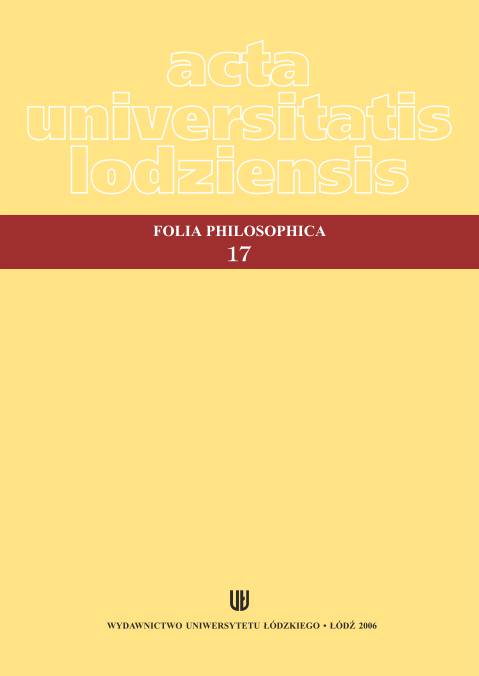Cyrkularność w definiowaniu przez postulaty pojęcia wiedzy logicznej
DOI:
https://doi.org/10.18778/0208-6107.17.05Abstrakt
In this paper I critically evaluate the Implicit Definition Theory and its possibility of resolution of two main problems concerning logical knowledge: the explication and the justification. I point at five results that can be obtained: apriority, factuality, normativity applicability and non-circularity. I argue that in case of explication all mentioned results can be obtained but in case of justification the circularity is inevitable. In the last paragraph I propose a solution of this problem.Bibliografia
Boghossian P. [1997], What the externalist can know a priori, "Proceedings of the Aristitotelian Society" 97, s. 161-75.
Google Scholar
DOI: https://doi.org/10.1111/1467-9264.00011
Boghossian P., Peacocke C. (eds) [2000], New essays on the a priori, Clarendon Press, Oxford.
Google Scholar
Boghossian P. [2000], Knowledge of Logic, [w:] P. Boghossian i C. Peacocke (eds), s. 229-255.
Google Scholar
DOI: https://doi.org/10.1093/0199241279.003.0010
Burge T. [1988], Individualism and self-knowledge, "Journal of Philosophy" 85, s. 649-663.
Google Scholar
DOI: https://doi.org/10.5840/jphil1988851112
Carnap R. [1934], Logische Syntax der Sprache, Viena: Springer Verlag.
Google Scholar
Carnap R. [1956], Meaning and Necessity, University of Chicago Press, Chicago-London.
Google Scholar
Davies M. [2000], Externalism and armchair knowledge, [w:] P. Boghossian i C. Peacocke (eds), s. 384-415.
Google Scholar
DOI: https://doi.org/10.1093/0199241279.003.0016
Dummett M. [1999], The logical Basis of Metaphysics, London: Duckworth.
Google Scholar
Field H. [1977], Logic, Meaning and Conceptual Role, "The Journal of Philosophy" 74, s. 379-408.
Google Scholar
DOI: https://doi.org/10.2307/2025580
Goldman A. [1976], Discrimination and perceptual knowledge, "Journal of Philosophy" 72, s. 771-791.
Google Scholar
DOI: https://doi.org/10.2307/2025679
Gentzen G. [1934], Untersuchugen über das logische Schliessen, ,,Mathematische Zeitschrift" 39, s. 176-210, 405-431.
Google Scholar
DOI: https://doi.org/10.1007/BF01201363
Hale B., Wright C. [2000], Implicit Definitions and the a priori, [w:] P. Boghossian i C. Peacocke (eds), s. 255-286.
Google Scholar
DOI: https://doi.org/10.1093/0199241279.003.0012
Harman G. [1987], (Nonsolipsistic) Conceptual Role Semantics, [w:] E. Lepore (ed.), New directions in Semantics, Blacwell, Oxford, s. 55-81.
Google Scholar
Harman G. [1993], Meaning Holism Defended, [w:] J. Fodor and E. Lepore (eds), Holism: A consumer update, Rodopi, Amsterdam, s. 163-171.
Google Scholar
DOI: https://doi.org/10.5840/gps1993467
Henderson D., Horgan T. [2000], What is a priori, and what is it good for?, [w:] D. Henderson, T. Horgan (eds), The Role of the A Priori (and of the A Posteriori) in Epistemology, ,,Southern Journal of Philosophy", Spindel Conference Supplement 38.
Google Scholar
DOI: https://doi.org/10.1111/j.2041-6962.2000.tb00930.x
Jackson P. [1998], From Metaphysics to Ethics: A Defense of Conceptual Analysis, Oxford: Clarendon Press.
Google Scholar
Kitcher P. [2000], A Priori Knowledge Revisited, [w:] P. Boghossian and C. Peacocke (eds), s. 117-150.
Google Scholar
Margolis E., Laurence S. [2001], Boghossian on Analyticity, "Analysis" 61(4), s. 293-303.
Google Scholar
DOI: https://doi.org/10.1093/analys/61.4.293
Nozick R. [1981], Philosophical Explanation, Oxford University Press, Oxford.
Google Scholar
Peacocke C. [1991], Understanding logical constants: a realist's account, Proceedings of the British Academy 73.
Google Scholar
Peacocke C. [1992], A Study of Concepts, MIT Press, Cambridge, Mass.
Google Scholar
Peacocke C. [1997], Metaphysical necessity, understanding, truth and epistemology, "Mind" 106, s. 521-574.
Google Scholar
DOI: https://doi.org/10.1093/mind/106.423.521
Peacocke C. [2000], Explaining the a priori: the programme of moderate rationalism, [w:] P. Boghossian i C. Peacocke, s. 255-284.
Google Scholar
DOI: https://doi.org/10.1093/0199241279.003.0011
Quine W. V. O. [1951], Two Dogmas of Empiricism, ,,The Philosophical Revue" 60, s. 20-43.
Google Scholar
DOI: https://doi.org/10.2307/2181906
Quine W. V. O. [1960], Carnap and Logical Truth, "Synthese" 12, s. 350-374.
Google Scholar
DOI: https://doi.org/10.1007/BF00485423
Quine W. V. O. [1964], Implicit Definition sustained, "Journal of Philosophy" 61, s. 71-74.
Google Scholar
DOI: https://doi.org/10.2307/2023271
Quine W. V. O. [1967], The Ways of Paradox, Harvard University Press, Cambridge.
Google Scholar
Quine W. V. O. [1970], Philosophy of Logic, Prentice Hall, New York.
Google Scholar
Quine W. V. O. [1980], From a logical point of view, Harvard University Press, Cambridge, Mass.
Google Scholar
Sellars W. [1974], Meaning as functional classification, "Synthese" 27, s. 417-37.
Google Scholar
DOI: https://doi.org/10.1007/BF00484606
Sosa E. [1997], Reflective knowledge in the best circles, "Journal of Philosophy" 14, s. 410-430.
Google Scholar
DOI: https://doi.org/10.2307/2564607
Sosa E. [1997], How to resolve the pyrrhonian problematic: a lesson from Descartes, "Philosophical Studies", LXXXV, s. 229-249.
Google Scholar
Wright C. [1983], Frege's conception of numbers as objects, Aberdeen University Press, Aberdeen.
Google Scholar
Wright C.[1985], Facts and Certainty, "Proceedings of the British Academy" 71, s. 429-472.
Google Scholar
Wright C. [2001], (Anti)sceptics simple and subtle: Moore and McDowell, Preliminary Draft, wersja internetowa.
Google Scholar
Pobrania
Opublikowane
Jak cytować
Numer
Dział
Licencja

Praca jest udostępniana na licencji Creative Commons Attribution-NonCommercial-NoDerivatives 3.0 Unported License.












